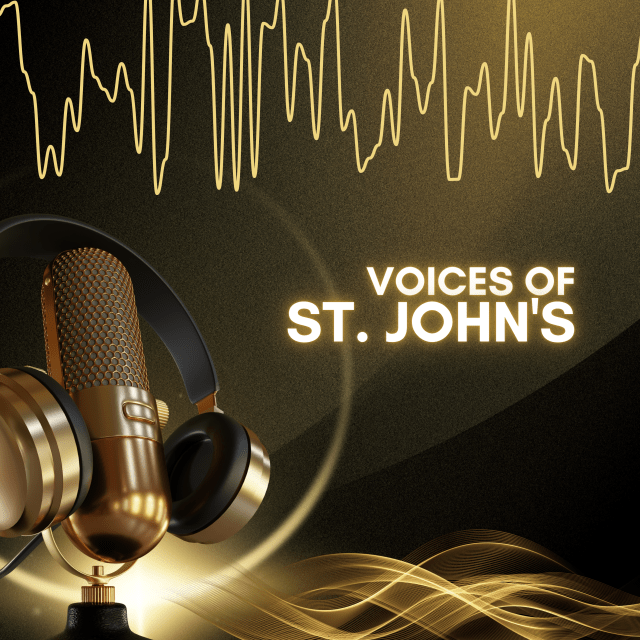
It is unusual for students to be excited about a final project, but that is what happened this past semester in the Storytelling across Media course in The Lesley H. and William L. Collins College of Professional Studies (CCPS) as the class culminated their studies by creating the podcast series “Voices of St. John’s.”
“So many of us have stories from our ‘everyday lives’ that go unspoken, and some are in desperate need of an outlet or platform for their expression,” said Meghan M. Dunn, Ph.D., Assistant Professor of Public Relations in the Division of Mass Communication, who taught the course. “The hope of this project was not only to learn how to engage with multiple mass media modalities in an age where ‘content is king’ and ‘the medium is the message,’ but to provide a platform for students to share with others what inspires and drives them—what makes them come alive.”
Hosted on the Instagram account, @VoicesOfStJohns, and accessible through the link in its bio, https://linktr.ee/voicesofstjohns, the podcasts are the product of the class’s collective efforts at telling stories in a manner that interrogates and explores the nuanced relationships between media and culture. The class first surveyed different storytelling media throughout history (e.g., the spoken word, written word, books/print, radio, film, and social media), and then voted on which kind of media modality they wanted to collectively create as a class.
For most of the students, this was their first attempt at creating a podcast. They voted on the account name for their Instagram, helped select its profile picture, and provided feedback throughout various stages of the podcast creation process. They were also taught how to use professional podcasting equipment and editing software by Carolyn Rutigliano, Associate Production Manager at St. John’s Instructional Television, Film, and Radio Center.
The podcasts vary in length from less than seven minutes to more than two hours, and cover topics that range from “the criminalization of Black men and women in media throughout American history” to “discussing how our media companies, like Facebook and Google, have so much power today that they get to act like a borderless government.”
Part of Dr. Dunn’s class also focused on a journalism genre known as redemption narratives and their power to help individuals and communities transcend tragedy or move forward in the wake of large-impact events. “This podcast was a purging,” said student Roseanne Taborsky. “None of us ever forgot about the first mass murder in Great Neck, NY, but we were never able to talk about it since we all moved away. But we had to get this out; we lived with it for so many years. Dr. Dunn took me out of my comfort zone and I will always be grateful for that.”
“We started at the basic level,” explained Roseanne. “By the time we got to the final version, we had created a monster—in a good way. I was relentless. I was interviewing people I grew up with whom I haven’t seen in 40 or 50 years. I went back to places I never wanted to go in my life. But I was able to talk to people and laugh it out, and we just knew that we were freeing ourselves from someone who had a hold on us for all these years.”
For several students, like Frandy Zeferino, telling stories through an oral modality was not unfamiliar territory. Frandy works as a teaching intern at The Moth—a New York City-based nonprofit group “dedicated to the art and craft of storytelling”—and assists other Moth instructors with lesson planning and classroom instruction at storytelling workshops the group provides for local New York City schools. “The bulk of my job is to help kids tell stories based on their lived experiences,” he said, “which is what this podcasting project was all about.”
“This project stood out because it challenged my ability to think critically about experiences that were exclusive to my racial background as a Black person,” added Frandy. “I appreciated having a professor who was willing to delve into the complexity of a topic and give me a few suggestions to get me started in my research. There were many instances during the making of this project in which my own experiences helped me create a better product.”
In the future, Dr. Dunn would be delighted to see @VoicesOfStJohns be a potentially ongoing project that is added to each semester by students and professors, resulting in a repository or catalogue of stories that serve as ‘barometer’ or ‘benchmark’ of the times and lives of those who attend the University. She would also like to revisit conversations that began this semester with the Education Engagement division of The Moth, in hopes of bringing them to campus to teach workshops to students in CCPS and other Schools and Colleges at St. John’s.
Related News
St. John’s Students Excel in Pair of Cybersecurity Competitions
Students in St. John’s University’s undergraduate cyber security systems and homeland security degree programs excelled recently at an Amazon-sponsored competition designed to unearth security vulnerabilities and promote real-time problem solving.
Students Share Entrepreneurial Vision at Johnny’s Innovation Challenge
More than 40 students from St. John’s University and beyond put their entrepreneurial instincts to the test on November 22 at the second annual Johnny’s Innovation Challenge.
St. John’s Opens Second Podcasting Studio to Students
St. John’s University has opened a second podcast studio to students, marking a new era of storytelling on the Queens, NY, campus. Located on the second floor of St. Augustine Hall in room 2-114, the space offers students real-world experience in digital media production, enabling them to produce professional-quality podcasts.
